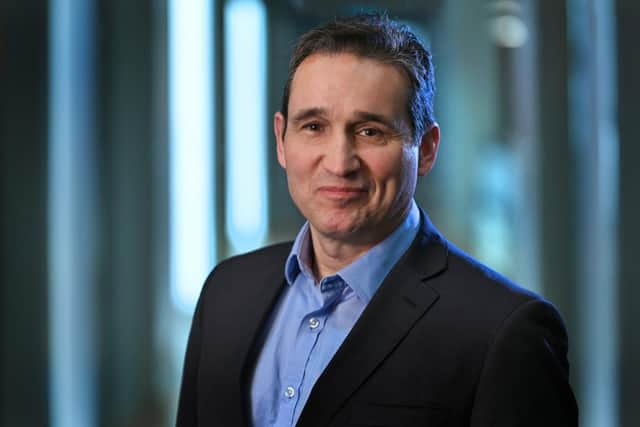Carbon Capture and Storage is the North’s ace card in Net Zero push: Jonathan Briggs
The recent creation of a dedicated government department focused exclusively on energy security and net zero is a positive signal and the Department of Energy Security and Net Zero’s Powering up Britain plans outline how the Government will enhance our country’s energy security and deliver on the UK’s ambitious net zero commitments.
Decarbonising dispatchable power – electricity that can be turned on and off according to demand - while maintaining a flexible and secure domestic energy supply will be a massive contributor to this.
Advertisement
Hide AdAdvertisement
Hide AdSo too will decarbonising energy intensive industry, such as cement production, steel works and industrial chemical production, as these industries will continue to be required at scale to build roads, houses, offices, trainlines and factories well beyond 2050.


Without capturing the carbon produced by these sectors, the UK will fail to achieve its net zero ambitions and risks damaging the future competitiveness of British industry.
Meeting the dual demands of energy security and net zero in the UK has meant the focus is often on building more renewable energy sources such as offshore wind and solar. However, these sources are hampered by inherent intermittency and may be impacted by potential transmission constraints as supply becomes more distant from the principal areas of demand. Consequently, dispatchable sources of power from combined heat and power plants and other efficient gas fired generators will continue to play an important role going forward.
In addition to continuing the development of renewables, the UK needs to prioritise the decarbonisation of power generation through Carbon Capture and Storage (CCUS). CCUS-enabled power generation is critical not only for the flexibility it provides on cloudy, breezeless days, but also to support the decarbonisation of hard-to-abate industries that will continue to require thermal energy.
Advertisement
Hide AdAdvertisement
Hide AdIn the UK, six industrial clusters produce the majority of industrial Co2 emissions. The three clusters in the north of England together account for almost two thirds of the UK’s emissions from power and industry. The Humber region is the largest emitting industrial cluster, generating 12.4 million tonnes of CO2 annually (30 per cent more than the next largest cluster).
Therefore, decarbonising it is an urgent priority to achieve national net zero targets. Furthermore, as this industrial cluster alone supports 1 in 10 jobs within the Humber region and contributes £18 billion to the UK economy each year, the Humber region has the most to gain and a lot to lose by effectively decarbonising.
The UK’s unique location in proximity to offshore storage fields is something few other countries in the world have.
The CCUS guidance published as part of the Powering up Britain announcements represents positive and very important progress in reaffirming the significance of CCUS at the heart of the UK’s plans to deliver on its energy security and net zero goals. The clarity and roadmap provided now offers the potential to unlock nearly £40 billion of private sector investment, which to-date has been held back awaiting the clarity that has now been provided.
Advertisement
Hide AdAdvertisement
Hide AdVPI Immingham, a combined heat and power plant in North Lincolnshire, is a key example of the type of facility that the Government can further support to decarbonise and is hoping to take advantage of the CCUS Cluster Sequencing application process outlined as part of the Powering Up Britain plans.
As one of the largest emitters in the Humber region, with existing infrastructure links to both the East Coast Cluster and Viking Transport and Storage CCUS project, VPI Immingham is an ideal candidate to deploy carbon capture technology to generate clean, low-cost power and steam and provide low carbon electricity to the grid.
From 2027, around 3.2 million tonnes of CO2 otherwise emitted will be captured, compressed and safely stored thanks to the flagship decarbonisation project - Humber Zero – taking place at VPI Immingham. Up to 95 per cent of the CO2 will be captured, providing clean, low cost and low carbon electricity to local industry, businesses and homes. Humber Zero includes similar plans for the neighbouring Humber Refinery owned by Phillips 66 Ltd. The CO2 will be transported via pipelines to a point around 100 miles offshore and injected into a geologic structure – such as a depleted gas field - more than two miles under the seabed for permanent storage.
To achieve the challenging goals set for 2050, it is clear the UK needs to move quickly; we need to keep the lights on but also the ensure the machines keep running, the furnaces stay fired and the conveyor belts keep moving. Tens of thousands of direct jobs, and many more indirectly, depend on this.
Advertisement
Hide AdAdvertisement
Hide AdWhat is required following the Government’s publication of its Powering up Britain plans is a continuation of momentum and the selection of ready to go, high impact projects like VPI, to the Governments CCUS Cluster Sequencing initiative.
Jonathan Briggs works for VPI and is the Director of Humber Zero and Chairman of the Carbon Capture and Storage Association (CCSA).